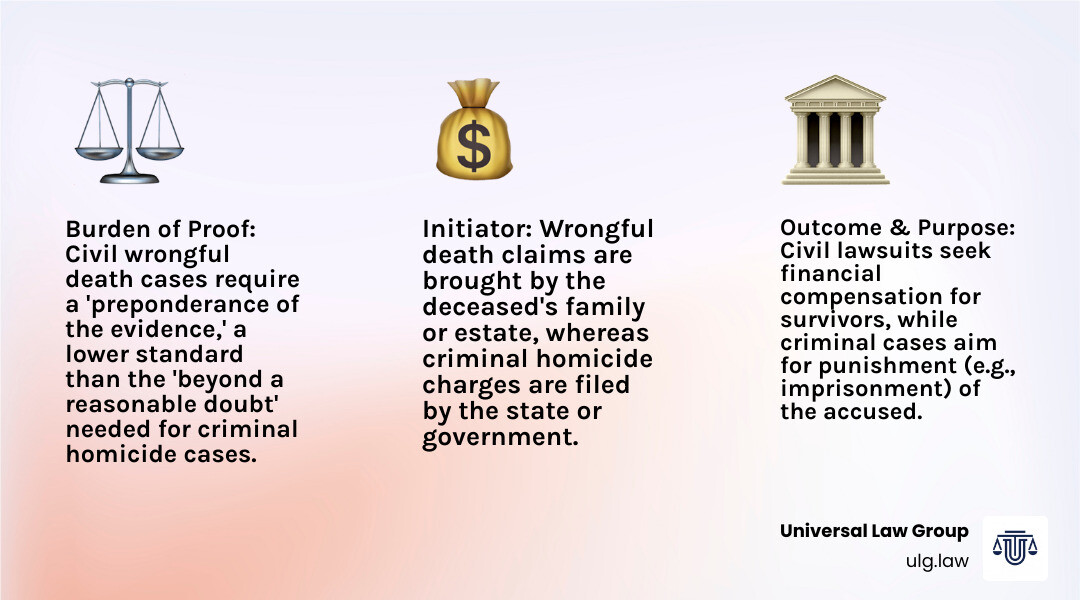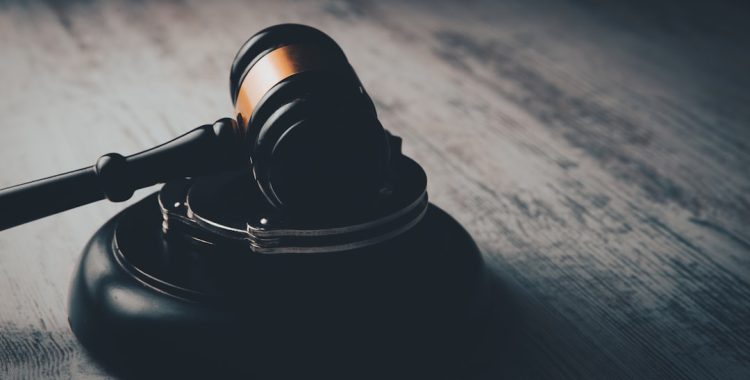Unlawful Death Lawsuit: A Comprehensive Guide to Your Rights
What You Need to Know About Unlawful Death Claims
An unlawful death lawsuit is a civil legal action filed when someone dies due to another party’s negligence, recklessness, or intentional actions. Here’s what defines these cases:
Key Elements of an Unlawful Death Lawsuit:
- Civil action – separate from any criminal case
- Negligence or wrongful act – defendant failed in their duty of care
- Causation – the defendant’s actions directly caused the death
- Damages – surviving family members suffered financial and emotional losses
- Eligible plaintiffs – typically spouse, children, parents, or estate representative
Common Causes Include:
- Motor vehicle accidents (including distracted driving, which accounted for 3,142 deaths in 2019)
- Medical malpractice
- Workplace accidents
- Defective products
- Criminal acts
The purpose of these lawsuits is to provide financial compensation to surviving family members and hold negligent parties accountable. Unlike criminal cases that focus on punishment, unlawful death claims focus on monetary recovery for the family’s losses.
Time limits matter – most states require filing within 1-3 years of the death, with Ontario requiring action within 2 years.
As someone who began my career as an Assistant District Attorney prosecuting diverse cases before transitioning to personal injury law, I’ve seen how families struggle with both the legal complexities and emotional burden of an unlawful death lawsuit. My experience in both criminal prosecution and civil litigation provides unique insight into navigating these challenging cases.

Establishing the Grounds for a Claim
When a loved one’s life is tragically cut short due to someone else’s actions, it leaves an immeasurable void. While no amount of money can truly compensate for such a loss, an unlawful death lawsuit provides a path to seek justice and financial recovery for the surviving family. But what exactly constitutes a wrongful death, and what must be proven to establish a successful claim?
Common Causes of Wrongful Death
Wrongful deaths can arise from a wide range of preventable incidents. These cases often stem from negligence or misconduct in various scenarios:
- Motor Vehicle Accidents: As one of the most frequent causes, these claims involve cars, trucks, motorcycles, and pedestrians. Negligent behaviors like speeding, reckless driving, or failure to yield can have fatal consequences. Distracted driving and drunk driving are major contributors to these tragic accidents.
- Medical Malpractice: When healthcare professionals fail to meet the accepted standard of care, the results can be dire. Examples include misdiagnosis, surgical errors, medication mistakes, and negligent post-operative care. These breaches of trust can lead to fatal outcomes for patients.
- Workplace Accidents: Employers have a duty to provide a safe working environment. Fatalities can occur due to unsafe conditions, lack of proper training, or failure to enforce safety regulations, particularly in high-risk industries.
- Defective Products: Manufacturers and distributors are responsible for ensuring their products are safe. A design flaw, manufacturing defect, or inadequate warning that leads to a death can be grounds for a product liability wrongful death claim.
- Premises Liability: Property owners must maintain a safe environment for visitors. Fatal accidents can result from unaddressed hazards, such as dangerous property conditions, inadequate security that enables criminal acts, or even dog attacks.
- Criminal Acts: A civil unlawful death lawsuit can be filed separately from any criminal prosecution. Because the burden of proof is different, it is possible to hold a party financially liable in a civil case even if they are acquitted of criminal charges.

The Four Essential Elements of a Claim
To successfully pursue an unlawful death lawsuit, we must prove four fundamental elements:
- Duty of Care: The defendant had a legal obligation to act with reasonable care to avoid harming the deceased. For example, drivers have a duty to obey traffic laws, and doctors have a duty to provide competent care.
- Breach of Duty: The defendant failed to uphold their duty of care. This failure, or “breach,” is often referred to as negligence.
- Causation: The defendant’s breach of duty directly caused the death. There must be a clear link between the negligent act and the fatal outcome.
- Damages: The surviving family members suffered measurable losses due to the death, such as financial hardship or emotional suffering.
Proving Negligence: In civil cases, the standard of proof is a “preponderance of the evidence.” This means we must show it is more likely than not (over 50% probable) that the defendant’s negligence caused the death. This is a lower standard than the “beyond a reasonable doubt” required in criminal cases, allowing families to seek justice even when a criminal conviction isn’t possible.
The Legal Process of an Unlawful Death Lawsuit
When you’ve lost someone you love due to another’s negligence, the last thing you want is to be overwhelmed by legal procedures. Understanding the process can help ease some of the uncertainty. Let’s walk through what to expect when pursuing an unlawful death lawsuit.
Who is Eligible to File an Unlawful Death Lawsuit?
State laws restrict who can file an unlawful death lawsuit to ensure that those most affected by the loss can seek justice. Typically, the right to file belongs to:
- Immediate family members: This usually includes the surviving spouse, children (including adopted children), and parents of the deceased.
- The personal representative of the estate: In many states, the executor or administrator of the deceased’s estate files the lawsuit on behalf of all eligible family members.
- Other financial dependents: In some cases, other relatives or individuals who were financially dependent on the deceased may be eligible.
Because these laws vary significantly by state, it’s crucial to determine who has the legal standing to file in your specific situation.
Understanding the Statute of Limitations
You have a limited time to file an unlawful death lawsuit. This deadline is called the “statute of limitations,” and missing it can permanently bar you from seeking compensation, regardless of the strength of your case.
The time limit varies by state, but it is often between one and three years from the date of death. However, there can be exceptions that shorten or extend this period. For example, claims against government entities often have much shorter notice periods. This is why acting quickly is so important. The sooner you consult an attorney, the more time there is to investigate your case and meet all critical deadlines.
Step-by-Step: Filing and Pursuing a Claim
Every unlawful death lawsuit follows a general path, though each case is unique. Here’s a simplified overview:
- Initial Consultation: We meet to discuss what happened, review the facts, and assess the viability of your claim. This is a confidential conversation with no obligation.
- Investigation: We gather all necessary evidence, such as police reports, medical records, and witness statements. We may also consult with experts like accident reconstructionists or economists.
- Filing the Complaint: We draft and file a formal complaint with the court. This document outlines the defendant’s negligence and the damages your family has suffered.
- Findy: Both sides exchange information through written questions, document requests, and depositions (interviews under oath).
- Settlement Negotiations: Most cases are resolved through negotiation. We advocate on your behalf with the defendant’s attorneys and insurance companies to reach a fair settlement.
- Trial: If a fair settlement cannot be reached, we are prepared to present your case to a judge or jury to seek the justice your family deserves.

Throughout this process, we act as your advocates and guides. While no amount of money can bring back your loved one, we are committed to helping you secure the financial stability and sense of justice your family deserves.
Understanding Compensation and Settlements
While you are grieving, your family may also face significant financial hardships. An unlawful death lawsuit is designed to provide financial stability during this difficult time and help secure your family’s future.
How Are Wrongful Death Settlements Calculated?
Putting a monetary value on a human life is impossible. However, the legal system calculates a settlement based on the full extent of the family’s losses. Key factors include:
- The deceased’s age, health, and earning capacity, including lost future income and benefits.
- The degree of negligence or recklessness of the at-fault party.
- The number of dependents who relied on the deceased for financial and emotional support.
- The loss of household contributions like childcare, home maintenance, and other services.
- The strength of the relationship between the deceased and the surviving family members.
Economic experts are often used to project these losses accurately, ensuring the full financial impact is considered.
Types of Damages You Can Claim
Compensation in an unlawful death lawsuit is categorized as economic, non-economic, and sometimes punitive damages.
| Economic Damages | Non-Economic Damages |
|---|---|
| Lost Income and Financial Support: The wages, benefits, and other financial contributions the deceased would have provided. | Loss of Companionship, Care, and Guidance: Compensation for the loss of love, affection, comfort, and guidance. |
| Medical and Hospital Bills: All medical expenses incurred from the injury until the death. | Pain and Suffering: Damages for the conscious pain the deceased experienced before their death (available in some jurisdictions). |
| Funeral and Burial Expenses: The costs associated with the funeral service and burial or cremation. | Loss of Inheritance: The value of assets the deceased would have likely accumulated and passed on to their heirs. |
| Loss of Household Services: The monetary value of services the deceased provided, such as childcare, cleaning, and home repairs. |
Economic damages cover the tangible, calculable financial losses your family has suffered. This often includes future lost income, final medical bills, and funeral costs.
Non-economic damages address the profound personal and emotional losses that don’t have a specific price tag, such as the loss of a parent’s guidance or a spouse’s companionship.
In cases of extreme negligence or intentional harm, punitive damages may be awarded. These are not meant to compensate the family but to punish the wrongdoer and deter similar conduct in the future.

Understanding these different types of compensation helps ensure your family receives a fair settlement for all the ways this tragedy has affected your lives.
Why Professional Legal Guidance is Crucial
Losing a loved one is devastating enough without having to steer the complex legal world of an unlawful death lawsuit. During this difficult time, you should not have to worry about legal procedures, calculating damages, or dealing with insurance companies.
The Benefits of Hiring an Experienced Attorney
Having the right legal team in your corner can make all the difference:
- Navigating Legal Complexities: Wrongful death laws are intricate and vary by state. An experienced attorney handles the legal maze so you can focus on your family.
- Dealing with Insurance Companies: Insurance adjusters are trained to minimize payouts. We handle all communications with them, protecting you from their pressure tactics and lowball offers.
- Maximizing Compensation: Our former prosecutor experience gives us a strategic advantage in building a compelling case to maximize your family’s financial recovery.
- Access to Expert Witnesses: We have established relationships with trusted experts like accident reconstructionists, medical specialists, and economists who can provide crucial testimony to strengthen your claim.
- Emotional Support and Guidance: We provide clear explanations and compassionate support, acting as your advocate when you need it most.
Common Mistakes to Avoid in an Unlawful Death Lawsuit
Families can unknowingly damage their case by making common errors. Here are some pitfalls to avoid:
- Accepting the First Settlement Offer: Initial offers from insurance companies are almost always far less than what your case is truly worth.
- Speaking to Adjusters Without Counsel: Anything you say to an insurance adjuster can be used against you. It’s best to direct all communications through your attorney.
- Posting on Social Media: Defense teams can misinterpret social media posts to argue that your damages are not as severe as you claim. It’s wise to limit your activity or set accounts to private.
- Missing the Filing Deadline: The statute of limitations is strict. Missing it means losing your right to file a lawsuit entirely.
- Delaying Legal Action: Evidence can be lost and witnesses’ memories can fade over time. Acting promptly is crucial for building a strong case.
- Handling the Case Without a Lawyer: Wrongful death cases are complex. Representing yourself puts you at a severe disadvantage against experienced defense attorneys and large insurance companies.
Conclusion: Seeking Justice for Your Loved One
When a loved one’s death is caused by someone else’s negligence, the pain is compounded by a sense of injustice. An unlawful death lawsuit provides a path to hold the responsible parties accountable and secure your family’s financial future.
Navigating this process requires proving negligence, understanding complex laws, and meeting strict deadlines. The compensation recovered can cover lost income, medical bills, and funeral expenses, while also acknowledging the profound loss of companionship and guidance.
Professional legal guidance is essential. An experienced attorney will protect you from insurance companies, manage the legal complexities, and fight to maximize your compensation. This allows you to focus on what truly matters: your family and your healing.
At Universal Law Group, our background as former prosecutors provides a unique advantage in fighting for families like yours. We know that no amount of money can replace your loved one, but we are committed to securing the justice and financial stability you deserve.
Seeking justice is about accountability and affirming the value of the life that was lost. You do not have to go through this alone. We are here to listen and to fight for you.
Contact a Houston wrongful death attorney for a consultation





